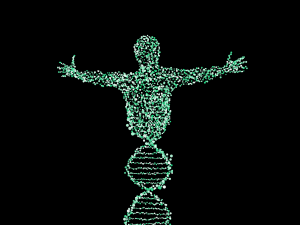
This post follows on from The Decline of Humanism, and continues its theme.
====================================================================================================
The Enlightenment, as is well known, was a philosophical and scientific movement which began in the 17th century and continued through the 18th. It promoted science, reason, rejected orthodox religion, and was the dominant force in the world of ideas during that period. At the beginning it was probably a necessary development in order to move things forward, even though some of the key figures were overconfident, too certain of their conclusions. However, it has now gone horribly wrong.
There is much that could be said but, in order to be brief, I’ll just mention one especially significant figure, Pierre-Simon Laplace, who summed up Enlightenment thinking in two famous quotes, firstly: “We may regard the present state of the universe as the effect of its past and the cause of its future. An intellect which at a certain moment would know all forces that set nature in motion, and all positions of all items of which nature is composed, if this intellect were also vast enough to submit these data to analysis, it would embrace in a single formula the movements of the greatest bodies of the universe and those of the tiniest atom; for such an intellect nothing would be uncertain and the future just like the past would be present before its eyes” (1). Secondly, it is reported that, when asked by Napoleon why he had written about all the laws of creation without mentioning God, he replied, “I had no need of that hypothesis”.

We therefore have a theory of strict determinism, absolute cause and effect, as is implied by a materialist understanding of a physical universe subject to the laws of nature, and any understanding of God as unnecessary and irrelevant.
The influence of this Enlightenment philosophy continues today. In my previous post I quoted Richard Dawkins, to show what he thinks a human being is. I’ll repeat that quote here: “We are machines built by DNA whose purpose is to make more copies of the same DNA. … This is exactly what we are for. We are machines for propagating DNA, and the propagation of DNA is a self-sustaining process. It is every living object’s sole reason for living” (2).
The renowned Harvard biologist E. O. Wilson expresses himself in identical terms: “The individual organism is only the vehicle (of genes), part of an elaborate device to preserve and spread them with the least possible biochemical perturbation. … The organism is only DNA’s way of making more DNA” (3).

Human beings are therefore, in their view, nothing more than meaningless by-products of biological processes. The late Stephen Hawking said something similar, although his choice of words was even more provocative: “The human race is just a chemical scum on a moderate-sized planet…” (4).
Here is the description of the human situation according to three prominent 20th century intellectuals:
- Nobel laureate Bertrand Russell: “That man is the product of causes which had no prevision of the end they were achieving; that his origin, his growth, his hopes and fears, his loves and his beliefs are but the outcome of accidental collocations of atoms; that no fire, no heroism, no intensity of thought and feeling can preserve an individual life beyond the grave … (continues) All these things, if not quite beyond dispute, are yet so nearly certain, that no philosophy which rejects them can hope to stand. Only within the scaffolding of these truths, only on the firm foundation of unyielding despair, can the soul’s habitation henceforth be safely built”(5).
- Nobel laureate Steven Weinberg: “The more the universe seems comprehensible, the more it also seems pointless. But if there is no solace in the fruits of our research, there is at least some consolation in the research itself. … The effort to understand the universe is one of the very few things that lifts human life a little above the level of farce, and gives it some of the grace of tragedy” (6).
- Nobel laureate Jacques Monod: “If he accepts this message in its full significance, man must at last wake out of his millenary dream and discover his total solitude, his fundamental isolation. He must realize that, like a gypsy, he lives on the boundary of an alien world; a world that is deaf to his music, and as indifferent to his hopes as it is to his sufferings or his crimes” (7).

So this is where the Enlightenment, which promised so much, has taken us. Perhaps the most succinct and striking summary of this attitude of modern science towards life was actually provided by a philosopher. This is the opening of Albert Camus’ The Myth of Sisyphus: “There is but one truly serious philosophical problem, and that is suicide. Judging whether life is or is not worth living amounts to answering the fundamental question of philosophy”. His suggestion is that being alive is so unpleasant that the only sensible option is to commit suicide, and the book is a rather contrived attempt to explain why we shouldn’t do so — his conclusion is that we have to imagine Sisyphus happy! (8)
I think it is fair to assume that Russell, Weinbert, Monod, and Camus, from what they say, must have lived in a state of permanent depression. We are told that we have to respect scientists, since they are the high priests (not sexism, all the above are men) of the Enlightenment, who have freed us from the superstitions of the past. When people like you or me are depressed, this is often called an illness, which needs treating, either by drugs or psychotherapy. When an Enlightenment scientist is depressed, we are told to accept their vision, and that if we don’t agree with them we have succumbed to illusions, regressed into superstition, rather than send them off to consult a shrink. I wonder why that is. (What happens when you psychoanalyse such people will be the subject of a later article.)

I am not in favour of seeking false comfort in illusions. If these scientists were telling the truth, I would agree that humanity should accept and face up squarely to its tragic situation. Is it possible, however, that they might be missing something? Suppose for a moment that what they are saying is not true, rather an inevitable consequence of their unremitting addiction to a materialist worldview.
I think it is reasonable to say that there is no scientific experiment which could determine whether or not there is purpose in the universe, nor for that matter whether the sole reason for our existence is to propagate our DNA. If that is true, then all the above statements have to be considered philosophical rather than scientific, even when they are made by scientists. Their truth or otherwise can therefore be considered in the light of these scientists’ preconceptions and psychology.
They are all prominent atheists, dedicated materialists, and often humanists (9). It is reasonable to ask therefore whether their scientific work leads them to these conclusions, or whether their atheism is the driving force behind their science. If you see the world through an atheist’s eyes before you enter a laboratory, is it not possible that this will in some way affect your work, and your conclusions?
Here’s a very interesting quote which can help us explore that idea. Richard Dawkins once said: “The universe we observe has precisely the properties we should expect if there is, at bottom, no design, no purpose, no evil and no good, nothing but blind, pitiless indifference.” (10). Isn’t it remarkable that the universe Dawkins claims to observe is an exact manifestation of his philosophical views? The universe I observe (which is not just the physical universe), partly on the basis of experiences I have had, is full of design, purpose, and is also caring and helpful (even if it sometimes appears cruel and indifferent). My understanding might be wrong, but it goes to show that how one sees the universe depends upon one’s own background, personal psychology and preconceptions. In the language of psychotherapy, are these scientists projecting the lack of true meaning in their own lives onto the universe?
Spiritual people do not share this pessimism, and in general are very positive about life and the universe. I won’t go into detail, but will just mention one spiritually oriented man’s celebration of the birth of his daughter: “Hallelujah for the miracle of life!” Compare that to the depressing vision of Dawkins, Wilson, and Hawking above. These scientists would say that such a person is seeking false comfort in illusions. They might be right, but on the other hand they might just be wrong.

Conclusion
Let me make it clear that I am not against science, as long as it is of high quality; I am grateful for the advances that the Enlightenment has brought us, both in science, and in its rejection of some religious thinking. Although the majority of quotes above are made by scientists in scientific texts, they are merely philosophy posing as science. One of the authors from my introduction to this series agrees. Mary Midgley explains what inspired her to write, and she could have been talking about the quotes in this article:
“This book had a very simple origin. In the early 1980s I was asked to speak at a conference on ‘Evolution and Religion’. This suddenly made me wonder whether the link between these two things was perhaps closer than had been noticed. Was the idea of evolution somehow beginning to be used, not so much as an antidote against religion but as a substitute for it — indeed, as a form of religion itself?
“I had been struck for some time by certain remarkable prophetic and metaphysical passages that appeared suddenly in scientific books about evolution, especially in their last chapters. Though these passages were detached from the official reasoning of the books, they seemed still to be presented as science. But they made startling suggestions about vast themes such as immortality, human destiny and the meaning of life. These are difficult topics with which philosophical and religious thinkers have long wrestled. But the scientific writers did not usually refer to any earlier discussions. They simply and confidently laid down their own surprising views about them. Their pronouncements seemed to be seriously intended. But it was far from clear on what level they were meant to be taken” (11 ).
Darwinism is one of the crowning glories of Enlightenment thinking. As Charles Eisenstein puts it: “It was the genius of Darwin to explain how complex life could develop from a foundation of deterministic material laws, collapsing the last stronghold of religion” (12). In that statement we can hear echoes of Laplace above, and understand why Darwinism is so appealing to the authors I’ve quoted, and to Enlightenment thinking in general.
If the philosophical position I have outlined above, which is not science, is where the Enlightenment has taken us, then it has gone too far, and something has gone seriously wrong. The Enlightenment may have been at its inception a necessary step forward in the progress of ideas, but it has regrettably turned into a hopeless cul-de-sac from which we need to escape. A new paradigm is long overdue, and fortunately is being outlined by many cutting-edge scientists.

====================================================================================================
Footnotes:
(1) Essai philosophique sur les probabilités, 1814
(2) https://www.azquotes.com/quote/573352. I assume this originally came from The Selfish Gene.
(3) Sociobiology; The New Synthesis, Harvard University Press, 1975, p3
(4) interview with Ken Campbell, Reality on the Rocks: Beyond Our Ken, 1995
(5) The Free Man’s Worship, 1903, https://users.drew.edu/jlenz/br-free-mans-worship.html
(6) The First Three Minutes, Flamingo, 1993, p149
(7) Chance and Necessity, Vintage Press, 1972, pp172–173
(8) Sisyphus was a mythical figure, who was subjected to an eternal punishment of having to roll a very heavy stone up a hill every day, which then fell back to the bottom.
(9) Dawkins and Wilson are prominent in modern Humanist organisations. Enlightenment science, atheism, and modern Humanism are intimately connected. For a critique of modern Humanism, please see my previous article.
(10) quoted by Michael Shermer in Scientific American, Feb. 2002, p35
(11) Evolution as a Religion, Routledge, 2002, Pviii
(12) The Ascent of Humanity, available online: https://charleseisenstein.org/books/the-ascent-of-humanity/alone-in-the-universe/